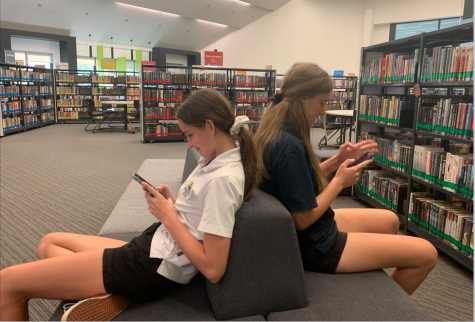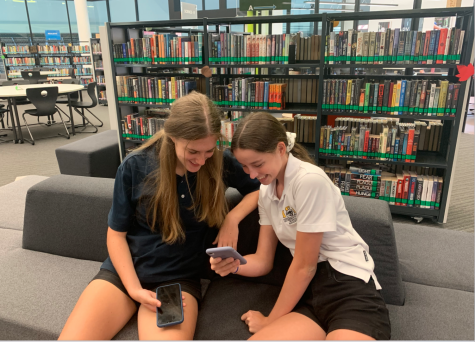New School Policy: ISB High School Students No Longer Allowed to Bring Cellphones to School
November 11, 2019
Just kidding!
But technology is definitely destroying the quality of human interaction. Since ISB often focuses on reflection as a method of learning, maybe it’s time we reflect on the amount of time spent using their technological devices.![]()
![]()
 The nature of social interactions as a whole have changed, a direct result of the vast technological advancements which have overcome traditional barriers in maintaining social contact, acquiring new information, and exchanging information. The emerging influence of such technology, also changes the way people use technology to increase, decrease, or avoid social interactions.
The nature of social interactions as a whole have changed, a direct result of the vast technological advancements which have overcome traditional barriers in maintaining social contact, acquiring new information, and exchanging information. The emerging influence of such technology, also changes the way people use technology to increase, decrease, or avoid social interactions.
How many times have you walked down the hall and pretended to be on your phone to avoid conversing with others? Well, you are not alone. Teens and adults all around the world are thoroughly immersed in their technological devices, oblivious to the world around them. The majority of communication is now accomplished through a keyboard or touch screen, and with social media, connecting is within the digital realm. This lack of face-to-face interactions can result in what Behavioural Scientists call a “social deficit”, those who have only a very limited appreciation, or no appreciation at all, of other people’s feelings and ideas
The art of conversation is one skill many young people lack. Asking questions about others, actively listening, and being able to read other people’s physical social cues are all part of being a skilled conversationalist. The constant compulsion to look at a screen does not give those that interact with them the impression that they are invested in the present conversation.
Mr. Boll, ISB’s Technology Coach, mentions “we all interact differently now, since we can communicate digitally and not just face to face. This has created a whole new set of rules to navigate and figure out.” Social relations are a fundamental aspect of human life, technological developments are fundamentally changing the way in which we experience such social relations.
 Little by little, the internet and mobile technology seems to be subtly destroying the meaningfulness of face to face interactions. Ironically, although technology has allowed the world to be more interconnected than ever, simultaneously on a more mundane level, technology is also disconnecting us from the world around us; perpetuating an almost imminent sense of isolation. As Sherry Turkle, author of Alone Together suggests, “We are starting to expect more from technology, and less from each other.”
Little by little, the internet and mobile technology seems to be subtly destroying the meaningfulness of face to face interactions. Ironically, although technology has allowed the world to be more interconnected than ever, simultaneously on a more mundane level, technology is also disconnecting us from the world around us; perpetuating an almost imminent sense of isolation. As Sherry Turkle, author of Alone Together suggests, “We are starting to expect more from technology, and less from each other.”
Science has further solidified the claim that individuals who constantly carry their devices around with them, are more susceptible to an increase in the stress hormone cortisone every time they hear a “ping” notification. Once this notification is read, a release of the “feel good hormone” dopamine, sweeps into the brain, activating the reward system. Ping, stress, relief. Repeat. This is the emotional cycle stimulated through the excessive use of technology.
Rather than spending time in person with friends or family, individuals now possess the ability to call or text them, which although convenient methods of communication, in no way stimulate emotions and cognitive functions in the same manner as sharing a face-to-face conversation.
Additionally, the over dependence which many millennials struggle with in relation to technology, demonstrates another concern. Ms. Valenzuela, academic counsellor mentions, “when I was younger, I would leave the house for hours alone, my parents would have to trust me to keep myself safe.” After the creation of smart technology such as the iPhone, adolescents leaving the house are expected to carry their phones with them to ensure that they are easily contacted by parents or guardians. Although safety is a priority, many argue that this constant connection to society could actually prove counterproductive as it could hinder the development of adolescent independence.
Mr. Callahan, academic counsellor, adds, “students are way too engrossed into their phones. Even when their personal life is in turmoil, seeing what their friends are up to on social media seems to take priority.” Cognitive research shows that extensive technology usage have been linked to stress, insomnia, anxiety and depression. The internet is full of information at all times, from useful facts about breaking news or identifying a heart attack to heated debates about how long it would take for zombies to overwhelm major cities. Living surrounded by this deluge of information causes information overload. The brain struggles to sift through the constant flow of information, and a person begins to live in a state of subconscious stress and anxiety.
Personally, I love spending hours on Instagram, which is definitely my favourite social media platform. Identifying the latest fashion trends and keeping up to date with what my friends all around the world are up to, (although I hate to say it) sometimes unconsciously takes priority over completing my homework. As I have become more aware of my dependence on technology, I have also been trying to make conscious efforts to limit my phone usage on weekends. In order to eradicate the negative aspects of technology, and gain the most net benefit from it, I believe that individuals must learn to use technology in moderation and balance.
Don’t be that family at a restaurant that sits around the table together, only to be engrossed by their phones. Make the conscious effort, before you forget how to hold a real life face-to-face conversation.
